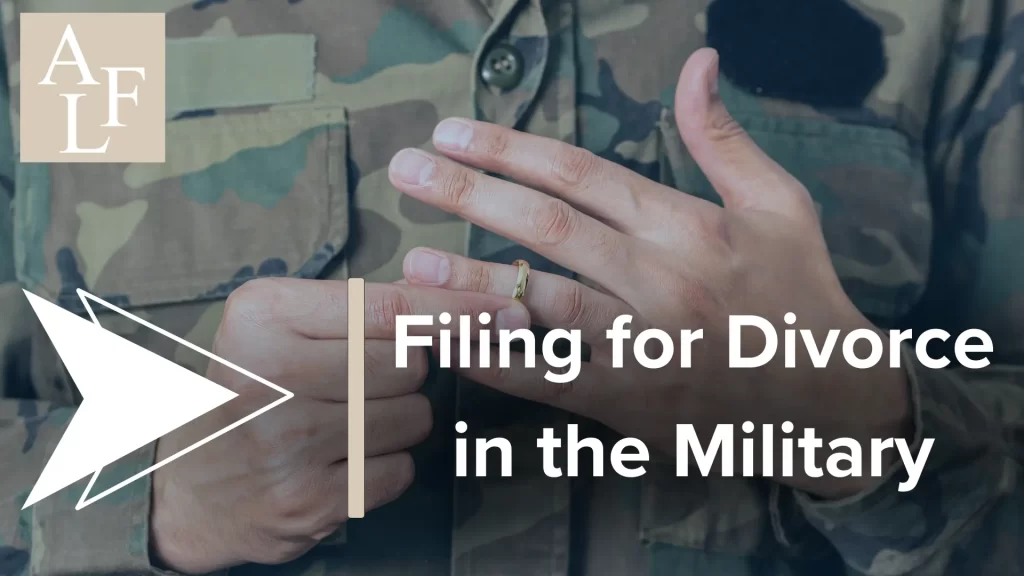
Military couples face unique challenges when they decide to divorce, often making the process even more complex and emotionally taxing than it is for civilians.
The transient nature of military life complicates matters of residency and jurisdiction since the service member and their spouse may have different states of residence. The choice of where to file for divorce can have significant implications for property division, alimony, and child custody.
Federal and state laws govern the division of military benefits, such as pensions and healthcare, requiring specific legal knowledge.
Child custody arrangements become especially challenging when the military deploys or stations one parent elsewhere. Divorcing spouses must create parenting plans that address these military-specific scenarios.
Serving divorce papers to an active-duty spouse becomes more complicated, especially when the military deploys or stations them overseas. Couples that include military service members have a higher overall divorce rate than the civilian population, as the added stress of the military lifestyle makes overcoming marital problems more difficult.
Are you an active-duty service member, or does your spouse serve in the military? If so, and if you are considering divorce, hiring a Texas lawyer with specific experience handling military divorces is crucial to help you through this complex process.
Jurisdiction and Residency Requirements
One of the first decisions you’ll need to make when filing for divorce is where to file. Military divorce laws offer service members and their spouses three options:
- The state where the service member is currently stationed
- The state where the service member claims legal residency
- The state where the non-military spouse resides
While the standard six-month state and 90-day county residency requirements apply, Texas law provides active-duty military personnel and their spouses additional flexibility in meeting those requirements compared to civilian couples. The military-specific provisions account for their mobile lifestyle and allow filing in Texas even when temporarily stationed or deployed elsewhere.
Military Divorce Laws and Regulations
Two important laws to be aware of when going through a military divorce are the Servicemembers Civil Relief Act (SCRA) and the Uniformed Services Former Spouses’ Protection Act (USFSPA). The SCRA allows active-duty service members to request a stay or postponement of divorce proceedings if their military service prevents them from responding or appearing in court. This protection ensures that service members’ military obligations do not compromise their rights.
State courts have the authority to treat military disposable retired pay as marital property under the USFPA. However, the Defense Finance and Accounting Service (DFAS) will limit a former spouse’s payments to less than 50% of the member’s disposable retired pay.
Military Benefits for Former Spouses
Former spouses of service members may keep certain military benefits if they meet the 20/20/20 rule. This means the marriage lasted at least 20 years, the service member served for at least 20 years, and there was a 20-year overlap between the member’s service and the marriage. Benefits might include medical care, commissary, and exchange privileges.
Each military branch has policies requiring service members to temporarily support family members after separation, even without a court order. However, seeking court-ordered support is always recommended.
Importance of Filing in a U.S. State Court
While it may be tempting to file for divorce overseas, filing in a U.S. state court is generally advisable. The U.S. might not recognize a foreign divorce, and significant risks can be associated with filing abroad. Our Texas attorneys can counsel you on the most appropriate jurisdiction for your case.
How Long Will a Military Divorce Take?
 An uncontested military divorce could potentially be completed in as little as two or three months. Most military divorces take closer to a year or longer due to factors like deployment, residency issues, and the SCRA. Additionally, the complexity of untangling military benefits and pensions during the divorce settlement process adds to the timeline.
An uncontested military divorce could potentially be completed in as little as two or three months. Most military divorces take closer to a year or longer due to factors like deployment, residency issues, and the SCRA. Additionally, the complexity of untangling military benefits and pensions during the divorce settlement process adds to the timeline.
Take the First Step Today and Contact a Katy Military Divorce Lawyer
At Adams Law Firm Attorneys & Counselors, PLLC, we understand the unique obstacles service members and their spouses face when seeking to end their marriage.
With over 35 years of experience in family law and specific expertise in military divorces, our dedicated Katy divorce attorneys are here to assist you. They will help you work toward a resolution that sets you on the path to a brighter future.
If you or your spouse are a military member and considering divorce, contact us online or call us today at (281) 391-9237 to schedule a consultation. See the other cases we handle and learn more about our firm to see how dedicated we are to guiding you through the legal process.



